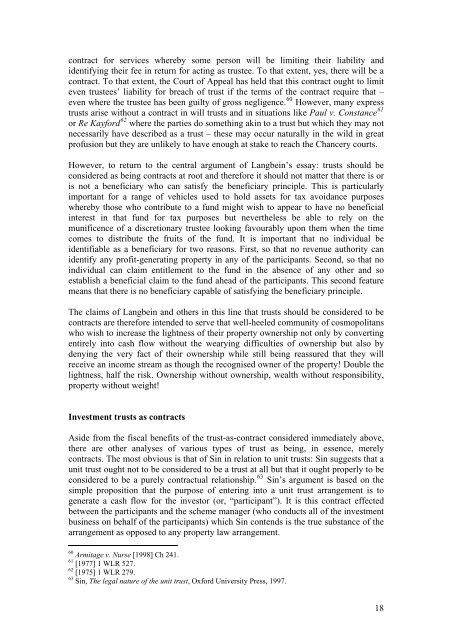The Unbearable Lightness of Property - alastairhudson.com
The Unbearable Lightness of Property - alastairhudson.com
The Unbearable Lightness of Property - alastairhudson.com
Create successful ePaper yourself
Turn your PDF publications into a flip-book with our unique Google optimized e-Paper software.
contract for services whereby some person will be limiting their liability and<br />
identifying their fee in return for acting as trustee. To that extent, yes, there will be a<br />
contract. To that extent, the Court <strong>of</strong> Appeal has held that this contract ought to limit<br />
even trustees’ liability for breach <strong>of</strong> trust if the terms <strong>of</strong> the contract require that –<br />
even where the trustee has been guilty <strong>of</strong> gross negligence. 60 However, many express<br />
trusts arise without a contract in will trusts and in situations like Paul v. Constance 61<br />
or Re Kayford 62 where the parties do something akin to a trust but which they may not<br />
necessarily have described as a trust – these may occur naturally in the wild in great<br />
pr<strong>of</strong>usion but they are unlikely to have enough at stake to reach the Chancery courts.<br />
However, to return to the central argument <strong>of</strong> Langbein’s essay: trusts should be<br />
considered as being contracts at root and therefore it should not matter that there is or<br />
is not a beneficiary who can satisfy the beneficiary principle. This is particularly<br />
important for a range <strong>of</strong> vehicles used to hold assets for tax avoidance purposes<br />
whereby those who contribute to a fund might wish to appear to have no beneficial<br />
interest in that fund for tax purposes but nevertheless be able to rely on the<br />
munificence <strong>of</strong> a discretionary trustee looking favourably upon them when the time<br />
<strong>com</strong>es to distribute the fruits <strong>of</strong> the fund. It is important that no individual be<br />
identifiable as a beneficiary for two reasons. First, so that no revenue authority can<br />
identify any pr<strong>of</strong>it-generating property in any <strong>of</strong> the participants. Second, so that no<br />
individual can claim entitlement to the fund in the absence <strong>of</strong> any other and so<br />
establish a beneficial claim to the fund ahead <strong>of</strong> the participants. This second feature<br />
means that there is no beneficiary capable <strong>of</strong> satisfying the beneficiary principle.<br />
<strong>The</strong> claims <strong>of</strong> Langbein and others in this line that trusts should be considered to be<br />
contracts are therefore intended to serve that well-heeled <strong>com</strong>munity <strong>of</strong> cosmopolitans<br />
who wish to increase the lightness <strong>of</strong> their property ownership not only by converting<br />
entirely into cash flow without the wearying difficulties <strong>of</strong> ownership but also by<br />
denying the very fact <strong>of</strong> their ownership while still being reassured that they will<br />
receive an in<strong>com</strong>e stream as though the recognised owner <strong>of</strong> the property! Double the<br />
lightness, half the risk. Ownership without ownership, wealth without responsibility,<br />
property without weight!<br />
Investment trusts as contracts<br />
Aside from the fiscal benefits <strong>of</strong> the trust-as-contract considered immediately above,<br />
there are other analyses <strong>of</strong> various types <strong>of</strong> trust as being, in essence, merely<br />
contracts. <strong>The</strong> most obvious is that <strong>of</strong> Sin in relation to unit trusts: Sin suggests that a<br />
unit trust ought not to be considered to be a trust at all but that it ought properly to be<br />
considered to be a purely contractual relationship. 63 Sin’s argument is based on the<br />
simple proposition that the purpose <strong>of</strong> entering into a unit trust arrangement is to<br />
generate a cash flow for the investor (or, “participant”). It is this contract effected<br />
between the participants and the scheme manager (who conducts all <strong>of</strong> the investment<br />
business on behalf <strong>of</strong> the participants) which Sin contends is the true substance <strong>of</strong> the<br />
arrangement as opposed to any property law arrangement.<br />
60 Armitage v. Nurse [1998] Ch 241.<br />
61 [1977] 1 WLR 527.<br />
62 [1975] 1 WLR 279.<br />
63 Sin, <strong>The</strong> legal nature <strong>of</strong> the unit trust, Oxford University Press, 1997.<br />
18













